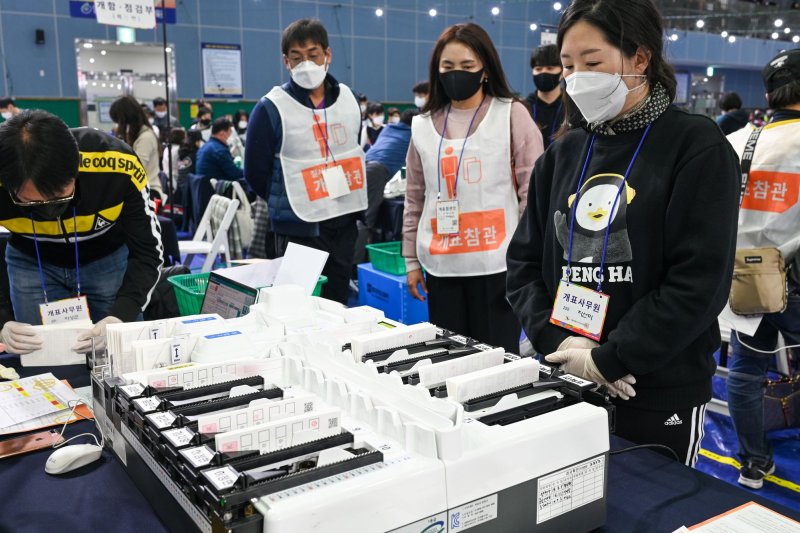After votes were counted in South Korea's parliamentary elections, the ruling Democratic Party emerged with a decisive victory. Photo by Thomas Maresca/UPI |
License Photo
SEOUL, April 16 (UPI) -- South Korea's ruling Democratic Party won a landslide victory in parliamentary elections held on Wednesday, a result which reflects the government's handling of the COVID-19 pandemic and leaves it poised to implement its agenda moving forward.
The liberal Democratic Party, along with its affiliated Platform Party, is estimated to have won 180 seats in the 300-seat National Assembly, South Korea's legislative body, according to the National Election Commission. The victory marks the largest number of seats any party has won since direct elections were first held in 1987.
The main opposition United Future Party and its affiliated party are estimated to have picked up 103 seats.
President Moon Jae-in said that he felt a "heavy responsibility" from the election results.
"The government will take heavy responsibility," he said Thursday, according to a presidential spokesman. "We will never be proud and will listen humbly to the voice of the people."
Moon also praised voters for observing safety protocols put in place at polling stations during the election on Wednesday, which included social distancing, temperature checks, masks and disposable gloves.
"Thanks to the active cooperation and participation of the people, during the global pandemic of COVID-19, South Korea was the only major country to hold a national election," he said.
Wednesday's elections, which saw the highest turnout in South Korea since 1992 at 66.2 percent of eligible voters, were seen by many as a strong endorsement of the Moon administration's response to the coronavirus crisis.
After a COVID-19 outbreak in February centered around the southeastern city of Daegu, South Korea has been able to flatten the curve of new infections through widespread testing, contract tracing and effective treatment. On Thursday, the Korea Centers for Disease Control and Prevention announced just 22 new cases, the fourth day in a row the number of new patients has been below 30.
The Democratic Party victory gives Moon a mandate and a clear path to move ahead with an economic agenda that includes raising the minimum wage and strengthening the social safety net while completing a reform of the powerful prosecutor's office.
"[The] Moon government's handling [of COVID-19] arguably was the main reason behind his party's big electoral victory," Ramon Pacheco Pardo, Korea Chair at the Institute for European Studies of Vrije Universiteit Brussel, said in a note.
"Widely seen as a referendum on Moon Jae-in's presidency as he is about to enter the final two years of his non-renewable five-year mandate, the results put him and his party in a strong position to move their agenda forward," Pardo wrote, adding that post COVID-19 economic reconstruction will be the top priority in the near term.
Moon has seen his approval rating steadily climb since the early days of the coronavirus outbreak. In a survey released Thursday by pollster Realmeter, Moon's popularity rose to 55.7 percent, while his negative rating fell to 39.7 percent.
The leader of the opposition United Future Party, Hwang Kyo-ahn, announced Wednesday that he will step down to take responsibility for his party's defeat. Hwang lost his parliamentary race in central Seoul's Jongno District to former Prime Minister Lee Nak-yon of the Democratic Party.
One noteworthy victory for the United Future Party came in the person of Thae Yong-ho, the former North Korean deputy ambassador to Britain who defected to the South in 2016. Thae, who advocates for a harder line against his former country, became the first North Korean defector to win a directly elected seat in the National Assembly, prevailing in the posh Seoul district of Gangnam.
A poll worker gives disposable plastic gloves to a voter at a polling station in Seoul during South Korea's parliamentary elections on Wednesday. Photo by Thomas Maresca/UPI |
License Photo
















